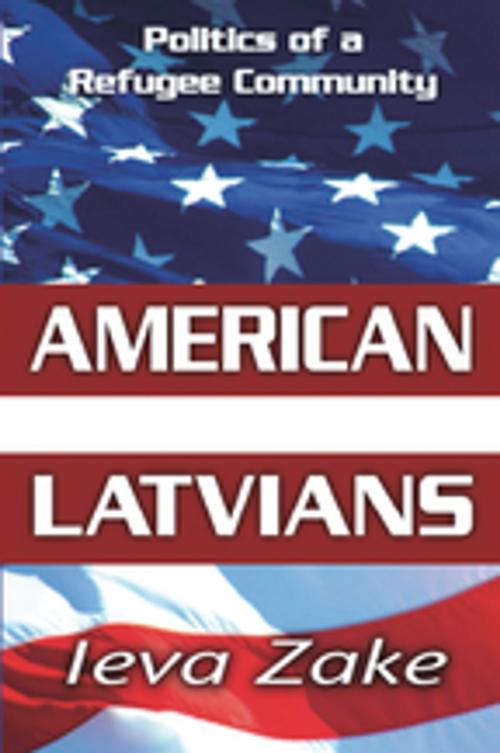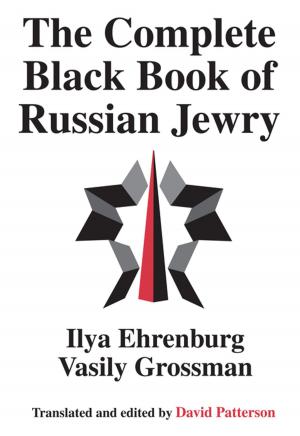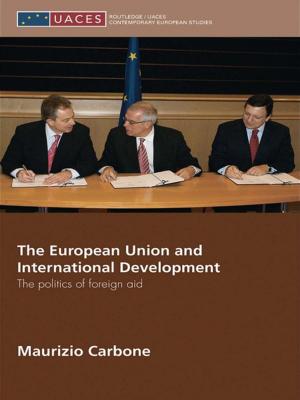American Latvians
Politics of a Refugee Community
Nonfiction, Social & Cultural Studies, Social Science, Cultural Studies, Minority Studies| Author: | Ieva Zake | ISBN: | 9781351532563 |
| Publisher: | Taylor and Francis | Publication: | September 8, 2017 |
| Imprint: | Routledge | Language: | English |
| Author: | Ieva Zake |
| ISBN: | 9781351532563 |
| Publisher: | Taylor and Francis |
| Publication: | September 8, 2017 |
| Imprint: | Routledge |
| Language: | English |
This book analyzes the political experience of a small and unique American ethnic group-American Latvians. This community was constituted by post-World War II political refugees, who fled Communism and arrived in the United States seeking safety and protection. For decades, they insisted on preserving their ethnic identity and therefore did not call themselves Latvian Americans. Instead, they formed a distinctive double identity, that is, they blended into the American society economically and socially, but refused to become assimilated culturally and politically. The book offers a detailed look into the life of this community of political refugees, which also provides a novel perspective on the Cold War as experienced by certain ethnic groups. From a theoretical point of view, the book makes two major contributions. First, it reasserts the need to understand the generalized category of "white Americans" or "white ethnics" with more nuance and attention to differences, and, second, it strengthens the so-called realist claim that refugees are not like other immigrants. In order to achieve these goals, the book provides compelling descriptions and interpretations of the most politically relevant moments in the experience of American Latvians in the period between the 1950s and the 1990s. Concretely, the book deals with topics as the American Latvians' anti-communist activism, the impact of the hunt for Nazis on Latvian emigres, the Soviet Union's anti-emigre propaganda campaigns and the exiled Latvians' involvement in the politics of national liberation in Latvia. The author strives to reveal the complexity of the refugee experience in the United States during the Cold War and its aftermath. Since such aspects of the life of ethnic groups in the United States have not been sufficiently studied, this book makes a substantial contribution to a fuller understanding of American immigration history and sociology of ethnic groups. It is well written, expertly organized, and will be of interest to a large readership at many levels of academia.
This book analyzes the political experience of a small and unique American ethnic group-American Latvians. This community was constituted by post-World War II political refugees, who fled Communism and arrived in the United States seeking safety and protection. For decades, they insisted on preserving their ethnic identity and therefore did not call themselves Latvian Americans. Instead, they formed a distinctive double identity, that is, they blended into the American society economically and socially, but refused to become assimilated culturally and politically. The book offers a detailed look into the life of this community of political refugees, which also provides a novel perspective on the Cold War as experienced by certain ethnic groups. From a theoretical point of view, the book makes two major contributions. First, it reasserts the need to understand the generalized category of "white Americans" or "white ethnics" with more nuance and attention to differences, and, second, it strengthens the so-called realist claim that refugees are not like other immigrants. In order to achieve these goals, the book provides compelling descriptions and interpretations of the most politically relevant moments in the experience of American Latvians in the period between the 1950s and the 1990s. Concretely, the book deals with topics as the American Latvians' anti-communist activism, the impact of the hunt for Nazis on Latvian emigres, the Soviet Union's anti-emigre propaganda campaigns and the exiled Latvians' involvement in the politics of national liberation in Latvia. The author strives to reveal the complexity of the refugee experience in the United States during the Cold War and its aftermath. Since such aspects of the life of ethnic groups in the United States have not been sufficiently studied, this book makes a substantial contribution to a fuller understanding of American immigration history and sociology of ethnic groups. It is well written, expertly organized, and will be of interest to a large readership at many levels of academia.















